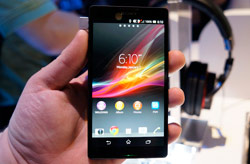 With the annual Consumer Electronics Show (CES) in Las Vegas winding down on Friday, Online Media Daily caught up with Avi Greengart, research director
for consumer devices at Current Analysis, to get his take on this year’s show. Here are some of his thoughts:
With the annual Consumer Electronics Show (CES) in Las Vegas winding down on Friday, Online Media Daily caught up with Avi Greengart, research director
for consumer devices at Current Analysis, to get his take on this year’s show. Here are some of his thoughts:
OMD: Even apart from Microsoft pulling out, has
CES lost its standing as the premiere event for showcasing new tech and mobile products?
Greengart: Sort of. The consumer electronics world has become very
platform-driven, and none of the platform drivers were in attendance. Apple and Amazon don’t go to trade shows, Google takes over Mobile World Congress but skips CES. Microsoft pulled out of CES
the one year it absolutely needed to be there to promote Surface and Windows Phone and do damage control on Windows 8 and Windows RT. However, there was plenty of innovation on display, just not from
the big device vendors. Sony and Samsung and LG all pushed 4KTV and OLED TV.
OMD: What, if any, device trends emerged that will play out in the coming year?
Greengart: Outside the traditional device vendors, there was plenty of innovation and several clear trends emerged: automotive, m-health, and app-driven personal
devices.
OMD: Were there any new phones, tablets or mobile media services that got your attention?
Greengart: There were
practically no phones announced at the show, so the ones that were announced naturally stand out: Sony’s Xperia Z, Huawei’s Ascend D2 and Ascend Mate 6.1 and ZTE’s Grand S LTE. Most
of those feature 1080p displays and quad-core processors. If Sony can get the Xperia Z to market in a timely fashion, it should have a hit on its hands.
Nvidia’s Project Shield
is vaporware, but really fascinating vaporware. Razer showed off Windows 8 gaming tablets that should find an audience, and Lenovo showed off a 27-inch coffee table Windows 8 tablet that won’t.
It’s insane how many cheap Chinese Android tablet vendors there are. No individual one stood out, but in the aggregate, they could impact the tablets and PCs in emerging markets. This may not
help Google much, however, since most of them don’t use Google services.
OMD: RIM is basing its comeback on its new BlackBerry 10 operating system. Did you
have a chance to preview a BlackBerry10 phone?
Greengart: Not at CES, but I got a full demo of production hardware and software ahead of the show. I’m
under a non-disclosure agreement, but I have been authorized to say that I’m impressed. That doesn't mean RIM will succeed -- it will be terribly behind in apps, content, and services, and it
may simply be too late to build a viable ecosystem -- but I was impressed with what I saw.
advertisement
advertisement